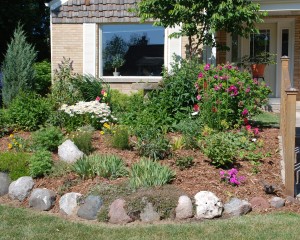
Summer has arrived and for many gardeners it means heat, drought and watering bans. “Help your gardens thrive despite limited time and these seasonal challenges,” explains gardening expert, author and TV host Melinda Myers. Myers recommends the following tips to help summer gardens flourish:
Put your yard waste to work in your garden. It’s good for your garden and the environment. Mulch annual and perennial flowers and vegetables with a one to two inch layer of shredded leaves, evergreen needles, herbicide-free grass clippings or other pest- and weed-free organic material.
Use woodchips and shredded bark to mulch pathways, trees and shrubs. Maintain a two to three inch layer of mulch around these plants. And keep the mulch away from the tree trunks and the crowns of the plants.
Organic mulch helps conserve moisture, reduce weeds and improve the soil as it breaks down. Wood mulch can temporarily tie up the nitrogen in the soil. If your plants are stunted or pale, add a bit of low nitrogen slow release fertilizer, like Milorganite, to compensate for this temporary lack of nitrogen.
Water plants thoroughly and less frequently whenever you irrigate the garden. This encourages deep roots, making your plants more drought tolerant and pest resistant. Water early in the day to reduce water lost to evaporation. Consider using drip irrigation to deliver water right to the plant roots where it is needed.
Check container gardens daily. Water thoroughly until the excess water runs out the bottom. Be careful when fertilizing these and annual flower and vegetable gardens. Use a low nitrogen slow release fertilizer if they appear to need a nutrient boost. The slow steady release of nutrients encourages growth without sacrificing flowers or burning drought stressed plants.
Don’t forget your trees and shrubs. Proper watering will also improve their health. Water new plantings whenever the top few inches of soil are dry. Don’t forget about established plants. These need a helping hand during extended periods of drought. Always water thoroughly to encourage deep drought resistant roots.
A well watered lawn is able to fight off weeds and stay green most of the season. But lawns are able to go dormant and usually recover from the heat and drought of a normal summer. A highly managed lawn will need an inch of water per week. Those depending solely on rainfall will need to eliminate summer fertilization and minimize foot traffic on the lawn when it is brown and dormant. Using a low nitrogen slow release fertilizer will avoid problems when unexpected droughts occur.
Keep mowing your lawn as long as your grass is actively growing. Mow the grass high, so it can shade out nearby weeds and produce plenty of energy to keep the grass healthy. Taller lawns form deeper roots and are better able to tolerate hot dry weather. Minimize the stress by removing no more than a third of the total grass height each time you mow. Grow cool season grasses like bluegrass, fescue and ryegrass 2-1/2 to 3-1/2 inches tall. Warm season grasses like bermudagrass, carpetgrass, centipedegrass and zoysia should be grown at 1 to 2 inches tall, while St. Augustine should be a bit higher, 2 to 3 inches, for best results.
Always use a sharp blade. The cut will be less noticeable and the wound will close quickly. This means healthy better-looking grass. And, be sure to leave the clippings on the lawn. They add nutrients, moisture and organic matter to the soil. Think of it as free fertilizer.
Finish every garden chore with a bit of cleanup. Sweep clippings, plant debris and fertilizer off walks, drives and patios, so it won’t wash into our storm sewers. Keeping plant debris out of our waterways is good for us and the environment.
Gardening expert Melinda Myers has 30 years of horticulture experience and has written over 20 gardening books, including Can’t Miss Small Space Gardening. She hosts the nationally syndicated “Melinda’s Garden Moment” television segments which air on network TV stations throughout the U.S. and “Great Lakes Gardener” seen on PBS stations throughout the country. In 2010, Myers launched Melinda’s Garden Moments for radio. Melinda also appears regularly as a guest expert on various national and local television and radio shows. She writes the twice monthly “Gardeners’ Questions” newspaper column and is a contributing editor and columnist for Birds & Blooms magazine. Melinda has also been a contributing editor and columnist for Backyard Living magazine and has written articles for Better Homes and Gardens and Fine Gardening magazines. Additionally, she hosted “The Plant Doctor” radio program for over 20 years. Myers’ web site is www.melindamyers.com. Melinda is also spokesperson for Milorganite, an organic nitrogen fertilizer that has been used by professionals and home gardeners for more than 80 years. www.milorganite.com
